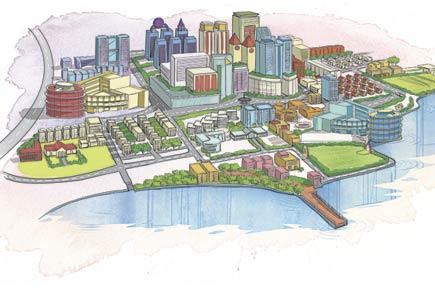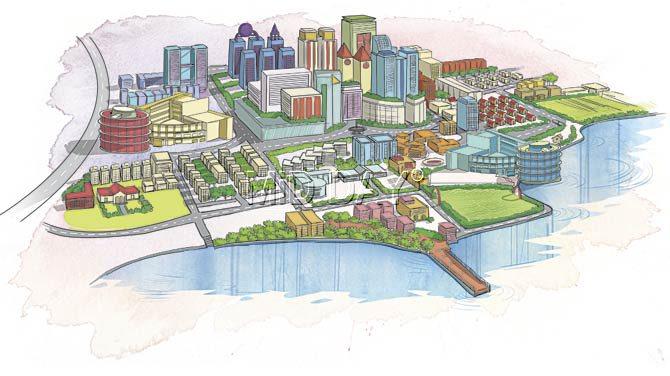If we move away from the nomenclature and branding of the campaign, we see, the idea is basically repackaging of the basic facilities that every city should offer to its citizens

If we move away from the nomenclature and branding of the campaign, we see, the idea is basically repackaging of the basic facilities that every city should offer to its citizens. This is what a urban planner friend commented after hearing about NDA’s Smart City Challenge.
ADVERTISEMENT

Graphic: Uday Mohite
Nevertheless 98 cities from across India are going to compete with each other for funds to become the next smart city(ies) of India. And to successfully pass the challenge, each must meet certain pre-requisite conditions which includes offering basic facilities such as water, electricity, healthcare, security and grievance redressal, among others, but using modern technologies.
The state of Maharashtra has nominated ten cities including Greater Mumbai, Thane, Dombivli-Kalyan and Navi Mumbai from the Mumbai Metropolitan region along with Solapur, Nashik, Pune, Amravati, Aurangabad and Nagpur for the challenge. As per the challenge, each city will be required to work along with private companies, which have already been shortlisted.
The government is offering a total of Rs 48,000 crore for the project, which will be released over five years starting from financial year 2015-16 to 2019-20. Each city will be given R100 crore to carry out the project every year. However, the state government/union territories, will have to match up with an equal amount for the project.
What is a smart city?
According to the government, there’s no concrete definition for a smart city. It changes from city to city, people to people, and country to country.
Our vision: Our blueprint
A smart city, for us, is an approach to improve the efficiency of city operations, the quality of life for its citizens and help grow the local economy. It’s also a city where its citizens are educated and aware of how to make use of these technologies for a better tomorrow.
Easy grievance redressal
E-platform for payments and grievance redressal
High speed wireless connectivity
Non-stop cellular connectivity, high-speed Internet connectivity and public Wi-Fi hotspots
City app
A comprehensive city guide app for citizens as well as tourists
Single emergency help line
A single, easy-to-remember helpline for citizens for all emergency situations
24x7 Information kiosks
Self-operated dynamic information kiosks that provide real-time information concerning traffic, weather, news, directions as well as details on public welfare schemes and plans.
Shelter homes for homeless
State-run shelter homes offering accommodation and rehabilitation of the homeless
Eco-friendly and sustainable transport
Utilise all modes of transport including roadways, railways as well as waterways, promote a sharing model and use eco-friendly means of transport
Online libraries
Digitised, connected libraries with facility for e-borrowing
Intelligent traffic system
Automated traffic signals with mechanism to recognise offenders and issue fines.
Crime Prevention and monitoring
Real-time monitoring and prevention of crime and safety and security of citizens particularly women, and the elderly
Smart storage system
Prevent wastage of food and other resources using smart methods and technologies
Sanitation and smart waste management
Modern, clean toilets, and a system for segregation and recycling of waste
Accessible infrastructure for the disabled
Easy-to-access public facilities and buildings for people with disabilities
Smart Disaster Management
Crisis response system for smart climate prediction and warning about natural calamities
Open green areas, pedestrian and cycling tracks
Gardens and theme parks for recreation, and designated space for pedestrians and cyclists
Smart housing
Affordable houses with centralised control of lighting, heating, ventilation, air conditioning, appliances and locks in gates and doors to offer improved comfort, convenience, energy efficiency and security
98
Total number of cities who have applied for the challenge. Maharashtra has nominated 10 cities.
20
Number of cities which will be selected for first round of funding based on their Smart City Plans (SCPs)
80%
Buildings in case of redevelopment and greenfield models of Smart Cities, should be energy efficient and green buildings.
15% of the total housing provided in greenfield development should be in the affordable housing category
10% of the Smart City’s energy requirement should come from solar energy
Plans are to be carried out using four models
>> Redevelopment (city renewal for area 50+ acres)
>> Greenfield Development (expansion in previously vacant area (over 250 acres)
>> Retrofitting (city improvement of over 500 acres)
>> Pan-city (Smart Solutions are applied covering larger parts of the city)
 Subscribe today by clicking the link and stay updated with the latest news!" Click here!
Subscribe today by clicking the link and stay updated with the latest news!" Click here!







